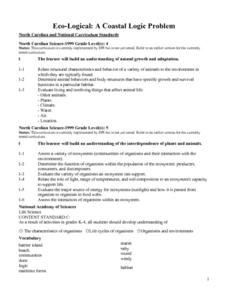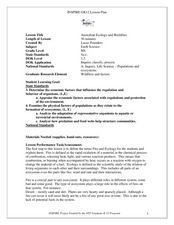Curated OER
Raising an Animal
Students observe reproduction and behavior in several types of animals and nurture a sense of responsibility and cooperation. They then examine external features of several different types of animal groups.
Curated OER
Commonalities and Differences from Africa to Cleveland as Evidence Through the Gullah Community Connection
Students explore Afro-American history. They identify the commonality between African, Carolinian and Cleveland Black culture. Students explore the water cycle, oceanography, hydrology and bio-geochemical processes. They discuss the...
Curated OER
Water Quality Survey: Monitoring the Sustainability of Pigeon Creek
Students research the History of Pigeon Creek (or any watershed in your area). In this environmental science lesson, students conduct field tests such as pH and nitrates. They collect data and compare what they collected with other groups.
Curated OER
Why Care About Amphibian Population Decline and Malformations?
Students examine the reasons for preserving wildlife. They look at reasons for amphibian malformations and write an essay about the ethical issues that this brings up. They listen to the teacher read quotes about extinction and how the...
Curated OER
Adventuring in the Archipelago
Students study Charles Darwin's voyage on the HMS Beagle and his visit to the Gal??pagos Islands. They click through an interactive map of the Gal??pagos Islands to read actual and fictional journal entries from a fellow eco-tourist.
Curated OER
Environmental Science/Water Pollution
Students study natural habitats, aquatic life, renewable and non-renewable resources. They discuss conservation efforts for sea otters and desert toad in this units.
Curated OER
Eco-Logical: A Coastal Logic Problem
Fourth graders study the characteristics of five coastal communities. They use logic cards and matching activities to identify the proper community for plant and animal species.
Curated OER
Primary Producers
Students examine the role of carbon in the oceans and how phytoplankton determine the levels present. In groups, they practice measuring primary productivity using two methods. They use the internet to research the role of phytoplankton...
Curated OER
The Story that Tracks Tell
Eighth graders observe and investigate animal tracks. They draw prints for local animals and switch with another student to guess the animal, identify animal tracks in a nearby wood lot, create plaster casts of the tracks, and write a...
Curated OER
A Day in the Life
Students use their research skills to investigate the behavior and characteristics of a rainforest animal. After creating a diary entry, they illustrate the habits and life cycle of the animal. They write the diary entry from the point...
Curated OER
Animal Habitats and Their Management
Students review components present for a quality animal habitat and then explore a goose pond to find out what animals reside there. They learn how wildlife managers work with the land so everything can co-exist together.
Curated OER
Bell Live! The Great Lakes: A Superior Adventure
Students participate in a virtual field trip to Lake Superior. In groups, they perform experiments in which test the level of toxins and bacteria in the water. They also watch video segments life in the lake and discuss their observations.
Curated OER
Ecology
Middle schoolers examine the relationship between the environment and those that have to live in it. They discover that we are responsible for our environment and understand the consequences of its neglect.
Curated OER
Harmful Algal Blooms in Full Bloom
Students calculate the total percentage of samples from the data on the graphs. In this marine science lesson, students analyze the concentration levels over a period of time. They suggest ways to lessen the effect of these blooms.
Curated OER
Prairie Field Trip
Students study prairie conservation and the plant and animal life within. In this prairie life activity students divide into groups and complete a lab activity.
Curated OER
Australian Ecology and Bushfires
Eighth graders discuss the different types of ecosystem. For this earth science lesson, 8th graders explain the benefits and harm of fire. They research articles about bush fires or controlled burn instance and share it with the class.















